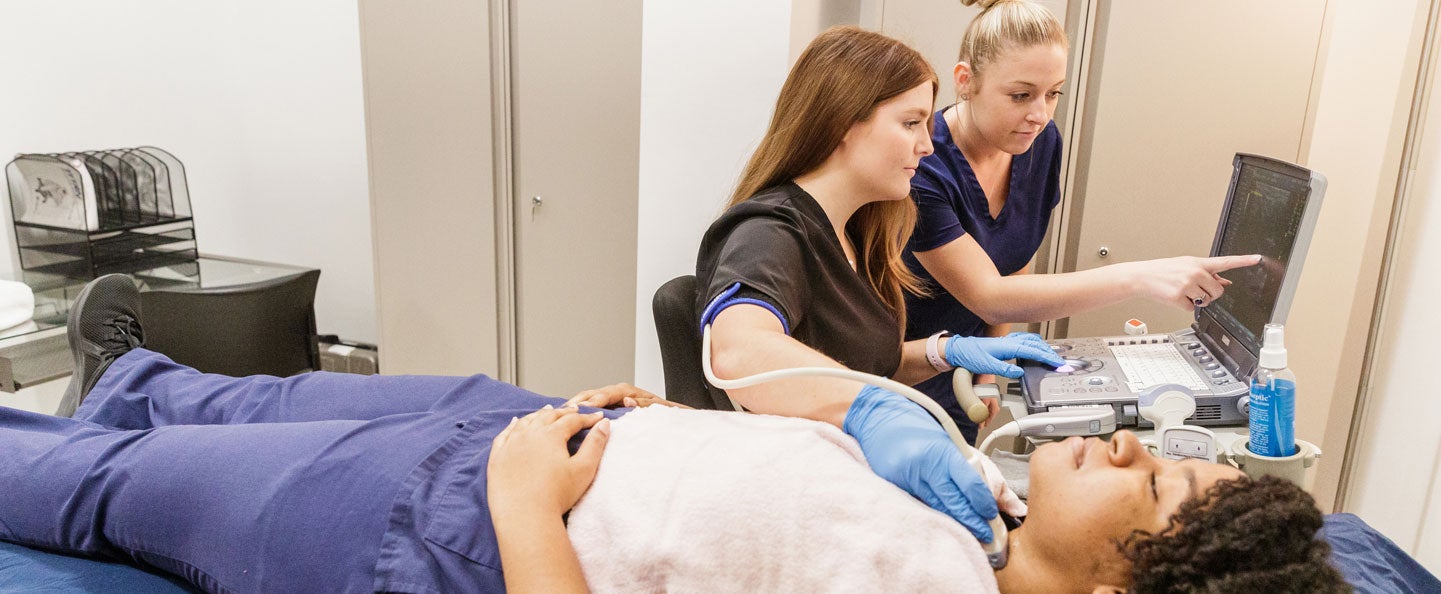The latest technology. The most compassionate care. Build a career on both with a Bachelor of Science in Radiologic Sciences from Georgia Southern University.
Locations
- Armstrong Campus (In Person)
- Online (Radiologic Sciences Bridge Program Only)
Why Earn a Bachelor of Science in Radiologic Sciences at Georgia Southern?
- Work one-on-one with patients as you help diagnose and treat injuries and illnesses.
- Specialize in radiation, ultrasound or magnetism.
- Already certified? Complete your degree through our online Bridge program.
- Get on-the-job training through partnerships with leading clinics.
- 130 credit hours to completion.
Modern medicine goes beyond the patient-physician relationship to encompass many other specialists and technicians. With a Bachelor of Science (BS) in Radiologic Sciences from Georgia Southern, you’ll become an important part of a patient’s care team, using high-tech methods to help doctors diagnose diseases and deliver cutting-edge treatment.
We offer five concentrations: cardiovascular/interventional science (CVIS), diagnostic medical sonography, nuclear medicine, radiation therapy or radiography. Each leads to initial certification in your chosen field. And no matter which you choose, you’ll benefit from small classes, access to fully equipped on-campus labs at our new Health Professions Academic Building, and real-world training through opportunities with clinics, hospitals and other sites.
Ready to Apply?
What Can You Do With a Bachelor’s in Radiologic Sciences?
Each of the five concentrations available in the radiologic sciences program prepares you for initial certification, a credential that opens doors to the fast-growing health care field. And by pursuing a bachelor’s degree, you signal to employers that you’ve put in the time to truly understand your profession — building knowledge not just in science but also developing communications and leadership skills that shorter programs just can’t deliver.
Where our graduates work:
- Abercorn Rehabilitation Center
- Centura Health
- City of Hope National Medical Center
- Cook Children’s Health Care System
- Effingham Women’s Health
- Greenville Health Systems
- HCA Healthcare
- IDR, Inc.
- Inova Health System
- Nationwide Children’s Hospital
- Planned Parenthood
- Rehabilitation Hospital of Savannah
- Soliant Health
- Westmed Medical Group
What our graduates do:
- Cardiovascular Invasive Procedures Technologist
- Cardiovascular Technologist
- EEG Technician/TechnologistRadiation Therapist
- Mammographer
- Mammography Technologist
- Nuclear Medicine Technologist
- Radiologic Sciences Laboratory Assistant
- Radiologic Technician
- Radiological Technologist
- Radiology Imaging Specialist
- Sonographer
- Special Procedures Radiographer
- Ultrasound Technologist
- X-Ray Technologist
What You’ll Learn
A BS in Radiologic Sciences combines hands-on training in technology and technique with the scientific knowledge necessary to understand your field. Regardless of the concentration you select, you’ll complete core curriculum classes in math, the sciences and liberal arts topics such as history and English.
In addition, every radiologic sciences student completes coursework focused on physics, patient care and assessment, research, technology and techniques, and other foundational topics.
See the CurriculumConcentrations
Students in the radiologic sciences program choose from one of five concentrations leading to careers in cardiovascular interventional science, radiography, radiation therapy, sonography or nuclear medicine.
Cardiovascular Interventional Science (CVIS)
Leap ahead of your competition in the country’s only accredited undergraduate program in cardiovascular technology. You’ll also get to work in interventional cardiology suites, cardiac cath labs, vascular hybrid suites and neurovascular arenas as you complete five clinical rotations.
Radiation Therapy
Go on the front lines against cancer in this concentration, which prepares you to administer daily radiation treatments to cancer patients. You’ll gain experience in as many as five different clinics in Georgia and South Carolina as you learn multiple techniques and procedures.
Nuclear Medicine
Learn to prepare and administer radioactive drugs for patients undergoing diagnostic scans in this concentration — among just a handful of similar undergraduate programs in the U.S. This concentration prepares you for a career as a CT or PET scan specialist, nuclear medicine technologist, radiation safety officer or chief technologist.
Diagnostic Medical Sonography
Examine organs, muscles and other parts of the human body using only soundwaves when you train for a career as a certified sonographer. After learning about different techniques and procedures, from obstetrics to cardiac imaging, you’ll get the chance to put your new knowledge into action while completing fieldwork at two or more clinical centers.
Radiography
Help physicians and radiologists diagnose a range of conditions, including fractures, tumors and lesions, in a high-tech career that combines physics, math and science. You’ll use techniques involving radiation, magnetism and computers while working directly with patients. Gain real-world experience at several clinical sites in and around the Savannah area.
Build Your Experience
Our radiologic sciences program depends on technology — but it’s our faculty who really set our program apart. Learn from their experience as you work with them during clinical experiences and while conducting research.
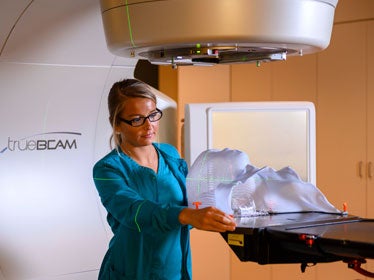
Train on Professional Equipment
Long before you go into the field, you’ll learn how to operate the same sophisticated imaging equipment used by professionals in our 63,000-square-foot Health Professions Academic Building, which opened in 2019.
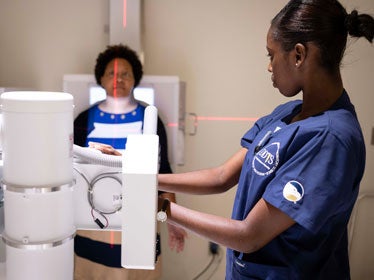
Clinical Experience
Every student in the radiologic sciences program completes at least one — and often five or more — clinical rotations at prestigious sites in Savannah and elsewhere in the Southeast.
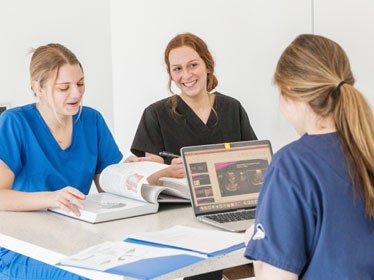
Student Organizations
Join local chapters of the Radiologic Sciences Student Association, Lambda Nu National Honor Society, Institute for Healthcare Improvement (IHI) and Health Sciences Student Association (HSSA) as you get even more involved with your work.
Want to Learn More?
Explore essential information about our BS in Radiologic Sciences program, including application details, accreditation status, and licensing disclosures. Gain insight into the program’s credibility and requirements to help you start your journey toward success with the knowledge you need.
Applications for the radiologic sciences program are accepted from Nov. 15 through March 1. (Applications for the Bridge Program are accepted at any time.)
Late applications will be considered on a case-by-case basis. Qualified applicants who met the March 1 deadline will be granted priority over applicants who did not meet that deadline. Certain programs may continue to review applications after the deadline until the program’s capacity is met.
Admission to Georgia Southern University does not guarantee admission to the concentrations in radiologic sciences. The department has a separate formal admissions process in addition to the admission process for the University. Applicants are required to submit a formal application to the program of interest and transcripts of all college and technical school coursework.
Follow these steps to complete the Georgia Southern application:
- Create an application account.
- Complete our online application using the PIN you received after creating your application account.
- Once complete, pay the $30 application fee or upload a valid fee waiver. Previous Georgia Southern applicants and dual enrollment students do not need to pay the fee.
- You can check your application status at My.GeorgiaSouthern.edu/admissions three days after completing your application. This page contains live information about your admission status, including a checklist of missing documents we need to make a decision.
Applicants to the radiologic sciences program must meet these minimum admission requirements:
- Acceptance into Georgia Southern University.
- Complete and pay the Allied Health Centralized Application Service (AHCAS) Application. Bridge students do not need to apply using this link.
- Complete the TEAS for Allied Health Professionals exam and submit the results to the Department of Clinical Sciences, Radiologic Sciences, by March 1. Applicants may contact the Georgia Southern University Testing Services at 912-344-2582 or visit MCC 206 for more information or to schedule the exam.
- Achieve a cumulative GPA of 2.5 or higher for all college work. Applicants with less than a 2.5 may be considered under special circumstances.
- Special Options (second certification) applicants must provide proof of ARDMS, ARRT or NMTCB certification.
- Students who are admitted to the program are strongly encouraged to complete remaining core courses during the summer semester prior to the start of the program. Failure to meet all Core requirements prior to beginning the program may delay your graduation.
- Prior to applying to the program, you must complete the following:
- 50 semester hours of core degree requirements that include two college English composition courses and college algebra or higher.
- Required lab sciences (significant preference for admission will be given to those applicants that have completed all of the five required sciences):
- Cardiovascular Interventional Science — Must include Human Anatomy and Physiology I with lab and three additional lab sciences in the program of study.
- Nuclear Medicine — Must include Human Anatomy and Physiology I with lab, Survey of Chemistry with lab or Introduction to Chemistry with lab, Physics with lab or Physical Environment with lab, and one additional lab science in the program of study.
- Radiography — Must include Human Anatomy and Physiology I with lab and three additional lab sciences in the program of study.
- Radiation Therapy — Must include Human Anatomy and Physiology I and II with labs, Physics with lab or Physical Environment with lab, and one additional lab science in the program of study.
- Advanced Medical Sonography — Must include Human Anatomy and Physiology I and II with labs, Physics with lab or Physical Environment with lab, and one additional lab science in the program of study.
Applicants not meeting the criteria stated above may apply and will be considered under special circumstances at a later date.
A new class begins in August (fall semester) each year. Applications will be considered on a competitive basis, and written notification of acceptance will begin in late March (no one will be notified of acceptance by phone). Applications received after the submission deadline will be considered only if seats are available. The amount of completed coursework, the number of science courses completed, TEAS scores and GPA determine competitiveness. Additional points may be awarded for completion of selected coursework in the major. Interviews may be required for qualified candidates. Please see your advisor for details.
Please note that prior conviction of a felony or misdemeanor may prevent you from sitting for the national certification examination. If you have been convicted of either a felony or misdemeanor, you must complete the pre-application review process as prescribed by the certification agency and provide the Department with verification of eligibility for the examination.
It is the student’s responsibility to ensure that a current and correct address is on file with the Department of Clinical Sciences, Radiologic Sciences program. The Department assumes no responsibility for postal items once students leave the radiologic sciences program.
Georgia Southern University is an equal opportunity education institution and does not discriminate on the basis of sex, race, age, religion, sexual orientation, disability or national origin in employment, admissions or activities.
Apply as a First-Year Student Transfer to Georgia SouthernIf you are already a certified radiologic sciences professional (RT), Georgia Southern offers two options to complete a bachelor’s degree:
BS Degree in Radiologic Sciences: Special Options Program
Location: In person at the Armstrong Campus
Technologists who are registered or registry-eligible in one area (radiography, nuclear medicine or radiation therapy) can complete a degree and become certified in an additional area. Once finished, graduates will receive a bachelor’s degree and will be registry-eligible in one of the following areas:
- nuclear medicine
- radiation therapy
- radiography
- sonography
BS Degree in Radiologic Sciences: Bridge Program
Location: Online
Radiographers, radiation therapists, sonographers and nuclear medicine technologists already certified by the ARRT (R, T, N, CI), NMTCB (CNMT), CCI (RCIS) or ARDMS (RDMS) may qualify to earn a BS in Radiologic Sciences at Georgia Southern.
Two concentrations are offered:
- The clinical track focuses on advanced skills such as computed tomography (CT), magnetic resonance imaging (MRI) or mammography. (Mammography concentration is available only to radiographers.) Completion of clinical education requirements leads to eligibility for certification. While didactic coursework in this track is offered fully online, clinical requirements must be completed at in-person sites. Students who live outside the Savannah area are responsible for identifying clinical education sites near their communities.
- The nonclinical track provides in-depth experiences in leadership, management and technical communication. All coursework is offered fully online.
Full- and part-time options are available.
See the Bridge CurriculumCardiovascular Interventional Science
The Department of Clinical Sciences anticipates that graduates of this program will seek the following professional state licenses or national certifications: Registered Cardiovascular Invasive Specialist (RCIS) and state licensure.
The Department of Clinical Sciences has determined that the required classes and educational activities of this academic program will qualify a graduate of this program to take the Cardiovascular Invasive Professional Certification Examination. The department has not determined whether this program satisfies the requirements of all states and territories for the RCIS or state licensure. Visit the Cardiovascular Credentialing International to determine the requirements of your state or territory.
Diagnostic Medical Sonography
The Department of Clinical Sciences anticipates that graduates of this program will seek the following professional state licenses or national certifications: Registered Diagnostic Medical Sonographer (RDMS).
The Department of Clinical Sciences has determined the required classes and educational activities of this academic program will qualify a graduate of this program to take the ARDMS Sonography Assessments for RDMS certification. The department has not determined whether this program satisfies the requirements of all states and territories for the RDMS certification and state licensure. Visit the American Registry for Diagnostic Medical Sonography to determine the requirements of your state or territory.
Nuclear Medicine
The Department of Clinical Sciences anticipates that graduates of this program will seek the following professional state licenses or national certifications: Registered Nuclear Medicine Technologist (RTN), Certified Nuclear Medicine Technologists (CNMT) and state licensure.
The Department of Clinical Sciences has determined the required classes and educational activities of this academic program will qualify a graduate of this program to take the national ARRT examination to obtain Registered Nuclear Medicine Technologists RT(N) credentials. The department has not determined whether this program satisfies the requirements of all states and territories for Registered Nuclear Medicine Technologist RT(N) or state licensure. Visit the American Society of Radiologic Technologists to determine the requirements of your state or territory.
The Department of Clinical Sciences has determined the required classes and educational activities of this academic program will qualify a graduate of this program to take the Nuclear Medicine Technology Certification Board (NMTCB) exam to obtain Certified Nuclear Medicine Technologists credentials. The department has not determined whether this program satisfies the requirements of all states and territories for the Nuclear Medicine Technologist credential or state licensure. Visit the Society of Nuclear Medicine and Molecular Imaging to determine the requirements of your state or territory.
Radiation Therapy
The Department of Clinical Sciences anticipates that graduates of this program will seek the following professional state licenses or national certifications: Registered Radiation Therapist, RT (T) ARRT and state licenses.
The Department of Clinical Sciences has determined that the required classes and educational activities of this academic program will qualify a graduate of this program to take the national ARRT examination to obtain Registered Radiation Therapist, RT (T) ARRT credentials. The department has not determined whether this program satisfies the requirements of all states and territories for the Registered Radiation Therapist, RT(T) or state licensure. Visit the American Society of Radiologic Technologists to determine the requirements of your state or territory.
Radiography
The Department of Clinical Sciences anticipates that graduates of this program will seek the following professional state licenses or national certifications: Registered Radiographer, RT(R) and state licensure.
The Department of Clinical Sciences has determined that the required classes and educational activities of this academic program will qualify a graduate of this program to take the national ARRT examination to obtain Registered Radiographer, RT (R) ARRT credentials. The department has not determined whether this program satisfies the requirements of all states and territories for the Registered Radiation Therapist, RT(T) or state licensure. Visit the American Society of Radiologic Technologists to determine the requirements of your state or territory.
Bridge Program
The Department of Clinical Sciences anticipates that graduates of the Radiologic Bridge program will seek the following professional state licenses or certifications: computed tomography (CT) certificate, magnetic resonance imaging (MRI) certificate and mammography certificate.
The Department of Clinical Sciences has not determined whether this program satisfies the license requirements for all states and territories for the CT certificate. For required disclosures on whether this program satisfies the license requirements of all states and territories for the CT certificate, click https://www.arrt.org/pages/earn-arrt-credentials/credential-options/computed-tomography to check the requirements of your state or territory.
The Department of Clinical Sciences has not determined whether this program satisfies the license requirements for all states and territories for the MRI certificate. For required disclosures on whether this program satisfies the license requirements of all states and territories for the MRI certificate, click https://www.arrt.org/pages/earn-arrt-credentials/credential-options/mri to check the requirements of your state or territory.
The Department of Clinical Sciences has not determined whether this program satisfies the license requirements for all states and territories for the mammography certificate. For required disclosures on whether this program satisfies the license requirements of all states and territories for the mammography certificate, click https://www.arrt.org/pages/earn-arrt-credentials/credential-options/mammography to check the requirements of your state or territory.
State authorization to provide a program related to the preparation of professionals may not indicate eligibility for certification/licensure in your state. Please consult the appropriate certification/licensure office in your state before enrolling in our program to confirm that your completion of this program will meet your state’s requirements.
Prepare for where you’re going. Start from wherever you are. At Georgia Southern, enjoy the flexibility of fully online courses that fit within your busy schedule. Online instructors weave interactive experiences into each course, ensuring you engage at a deeper level.
About Our Online ProgramsCardiovascular Interventional Science
The cardiovascular interventional science track is accredited by the Commission on Accreditation of Allied Health Education Programs (www.caahep.org) upon the recommendation of the JRCCVT.
Commission on Accreditation of Allied Health Education Programs (CAAHEP)
9355-113th St. North, #7709
Seminole, FL 33775
Phone: 727-210-2350
Fax: 727-210-2354
caahep.org
Diagnostic Medical Sonography
The diagnostic medical sonography program is accredited by the Commission on Accreditation of Allied Health Education Programs (www.caahep.org) upon the recommendation of the Joint Review Committee on Education in Diagnostic Medical Sonography (JRC-DMS).
Commission on Accreditation of Allied Health Education Programs (CAAHEP)
9355-113th St. North, #7709
Seminole, FL 33775
Phone: 727-210-2350
Fax: 727-210-2354
caahep.org
Nuclear Medicine
The nuclear medicine concentration at Georgia Southern University is accredited by the Joint Review Committee on Educational Programs in Nuclear Medicine Technology (JRCNMT), 820 W. Danforth Rd., #B1 / Edmond, OK 73003; phone 405-285-0546; mail@jrcnmt.org; www.jrcnmt.org. This program is currently on probation, but it is accredited.
For more information, go to the JRCNMT online directory of accredited programs and read the accreditation letter linked to the program’s directory listing (https://www.jrcnmt.org/find-a-program/). Implications of attending a program that is on probation are available at https://www.jrcnmt.org/students/program-on-probation-faqs/.
Radiation Therapy
The radiation therapy program at Georgia Southern University Armstrong Campus is accredited by the Joint Review Committee on Education in Radiologic Technology (JRCERT). The program has been accredited for a period of eight years.
JRCERT
20 North Wacker Drive, Suite 2850
Chicago, IL 60606-3182
mail@jrcert.org
Phone: 312-704-5300
Fax: 312-704-5304
www.jrcert.org
Radiography
The program is accredited by the Joint Review Committee on Education in Radiologic Technology (JRCERT). The program has been accredited for a period of 5 years. Contact information for the JRCERT is:
JRCERT
20 North Wacker Drive, Suite 2850
Chicago, IL 60606-3182
mail@jrcert.org
Phone: 312-704-5300
Fax: 312-704-5304
www.jrcert.org
Bridge Program
The Bridge program is accredited by the Commission of Colleges of the Southern Association of Colleges and Schools (1866 Southern Lane, Decatur, Georgia 30033-4097: Telephone number 404-679-4501).
MRI Exposure
Students interested in the radiologic sciences program must understand that there is a potential to be exposed to a Magnetic Resonance Imaging (MRI) environment. The MRI environment consists of strong magnetic fields and radiofrequency waves, which may be contraindicated for individuals who have devices implanted in or on their body that should not be subjected to an MRI environment. Additional information regarding MRI safety can be found on the internet and at www.mrisafety.com.
Essential Functions
All potential and enrolled students in any of the tracks in the radiologic sciences program must meet the intellectual, physical and social competencies required to provide safe client care. We have documented a list of essential skills and minimum physical capacity required to perform the duties of radiation and imaging science practitioners. These functions reflect performance abilities and characteristics that are also necessary to successfully complete the requirements of our programs. Prior to submitting an application, be sure to read Essential Skills and Minimum Physical Requirements for success in our programs.
Departmental Exit Exam
An exit exam is given in the final term of matriculation. Students must pass this exam in order to complete the program and graduate from the University.
Clinical Internship/Practicum Experience Update
Many of the clinical programs offered by the Waters College of Health Professions require a clinical internship or practicum experience to fulfill degree requirements. Pursuant to the University’s legal agreements, participants in clinical experiences are required to abide by the workplace rules of the clinical site. Sometimes these rules include vaccination requirements. As always, WCHP will continue to make every effort to place students at clinical sites. However, please be aware that we may be unable to locate a site to accept unvaccinated students, which may cause a delay or inability to progress and complete the program of study.
For All Online Programs
Federal law requires colleges and universities to make certain disclosures to prospective students of these programs. These disclosures include information on the University’s authority to operate outside of Georgia, complaint processes, adverse actions and refunds.
For required disclosures in general with regard to online programs offered by the University, visit the Office of Legal Affairs website.
Related Programs
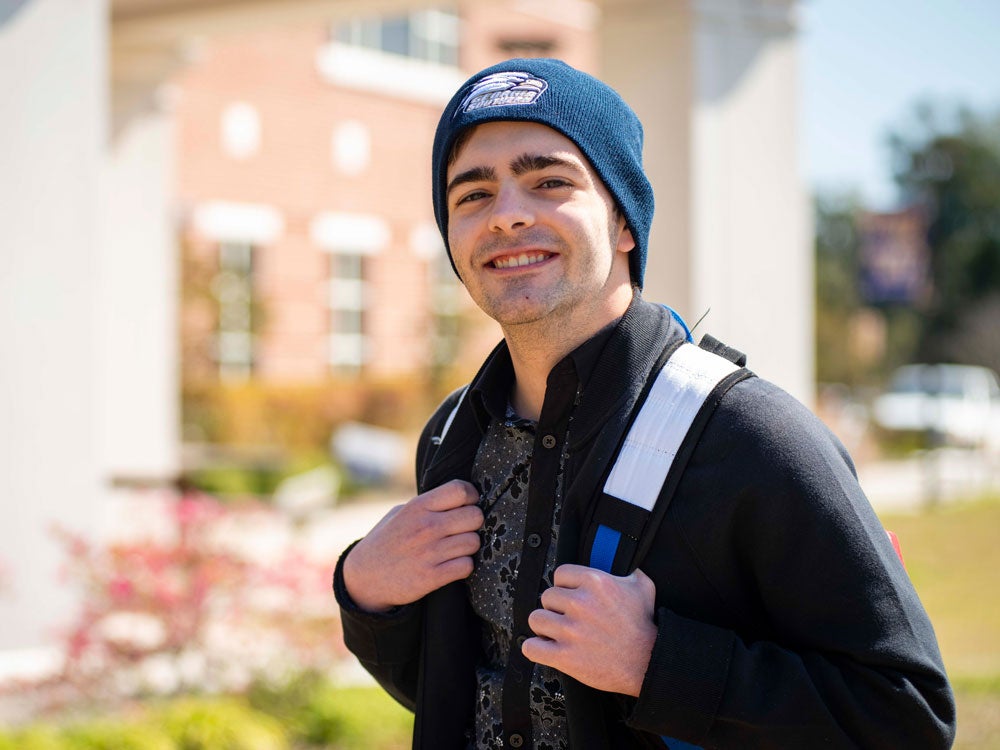
Take the Next Step
Play a vital role in helping physicians diagnose and treat disease with a BS in Radiologic Sciences. Contact us today to find out which specialty is right for you.

